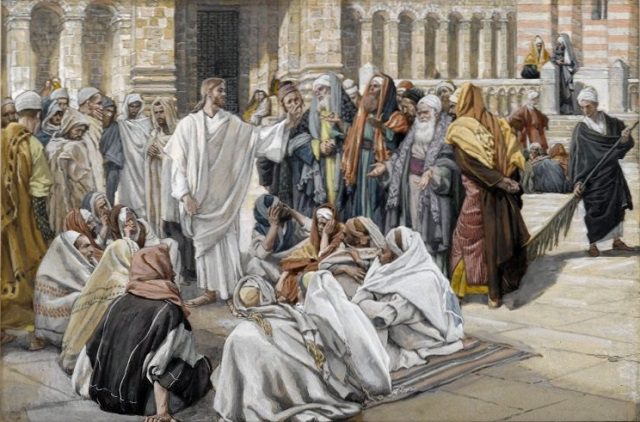The Learner
Well-Known Member
No, there are valid oral traditions, in BOTH testaments. There is no such thing as "oral law".
No, I did not. Your abuse of Mark 7:1-13 is a lie, not you as a person. Jesus did not condemn all tradition, just the made-up ones. The error is lumping them together.
Oral Tradition that is mentioned in 1 Cor 11:2; 2 Thess 3:14-15; 2 Thess 2:15, etc. does not refer to orally transmitting the message of the Bible. It refers to the Oral Tradition apart from the Written Tradition (the Bible); both flowing from the same divine wellspring.
The Oral Tradition has not been corrupted and we know this for three reasons:
1) Oral Tradition and Written Tradition compliment one another and not contradict each other. But not everything is written in the Bible, according to the Bible itself (i.e. John 21:25; Acts 20:35). Thus since not everything is in the written record if Oral Tradition says something that is not explicit in the Written Tradition that does not make the Oral Tradition wrong. It only means that that subject was not mentioned in the Written Record.
Oral Tradition was a long time aspect of the religious life of the Jews. They recognized the existence of Divine Oral Tradition. There are some passages in the New Testament, for example, that refer to the Divine Revelation of the Old Testament but deal with items not in the written Old Testament. It is obvious the Apostles knew and believed in a Divine Oral Tradition.
2) The importance of Oral Tradition is great. This is seen by the fact that St. Paul tells us to listen to and obey Tradition (that is Divine Tradition, not human customs) as Scripture. He even tells us that people who do not follow this Divine Oral Tradition are to be shunned (2 Thess 3:14).
All the possible teachings of Jesus cannot possible be placed into one book and the Bible itself affirms. Also, there were no New Testament Scriptures in the early decades of the Church. All that existed was the Oral Tradition of the Apostles. Even after the letters of the New Testament began to be written and passed around it was not until the 4th century that the Church put in place exactly which letters were to be considered Scripture and which were not. How the bishops made that decision was, in part, on whether the letter in question was consistent with the Oral Tradition handed down from the Apostles.
Oral Tradition ALWAYS precedes Written Tradition. Written Tradition (the bible) is a small subset of the larger Oral Tradition. This has always been the case - in the Old Testament and in the New Testament times.
3) I proper concern is whether or not this Divine Oral Tradition is passed on from generation to generation accurately. Well, God is not so cruel that He would not account for some way to preserve His Word. His Word, after all is life. We must have a way to preserve the Word of God. God did that through a Magisterium protected by the Holy Spirit. God has ALWAYS had a Magisterium. In the Old Testament times we had the Chair of Moses that Jesus mentions in Matt 23:2. For the New Covenant a new chair of authority was put into place --- just as was done with the previous four covenants in Old Testament times. This new chair was and is the Chair of Peter (Matt 16, Isa 22:21-23).
But how to we check to be sure, if we do not have the faith to trust God's Magisterium? Well, the same way that we can know for sure that the Bible we read today is the what was actually written in the First Century -- by comparing what we have today with the written record of history.
In the case of the Bible, we compare what we have today with extant manuscripts from as close to the first century as possible.
In the case of the Oral Tradition, the same is true. We look to extant manuscripts of sermons, essays, Church documents, etc. from the Church Fathers that affirm that what we believe today is the same things that they believed then.
There is NO doctrine of the Catholic Church that cannot be traced to the early Church. Over the centuries our understanding of doctrine has matured from that of the infant Church, but the doctrine remains unchanged. We know this because we can prove it with documentary evidence.
When Protestants posit a theological belief that is contrary to what the Catholics believe, I ask that person to show me where any of the Church Fathers believed has he believes. If the early Christians believed as the Protestants do today there would be some evidence of this -- essays, sermons, writings of some sort. But there are none. The Catholic Church, however, can produce truckloads of extant manuscripts from the First, Second, and Third Centuries that show the foundation for ALL that the Catholic Church believes.
This evidence is overwhelming and sure. There are no other works of antiquity that we are as sure about as we are about the teachings of the Catholic Church.
One of the rules of historical documentary evidence is that a manuscript that was written or copied 50 years after the actual event or after the original autograph is most likely to be more accurate than a copy made 500 years late.
Well the oldest extant manuscript we have of Plato was a copy made 900 years after Plato's death. In actuality we cannot possible know for sure if those writings are actually Plato's.
But with the New Testament writings we have extant copies only a few decades from the original autographs. This is POWERFUL evidence that the Bible we have today is indeed the accurate writings of the Apostles.
In similar manner, we have extant copies of the thinking and teachings of the Church Fathers that we can compare to prove that the Oral Tradition we teach today had its foundations and beginnings in the early Church.
If a person is to believe that the Platonic Dialogues are actually written by Plato, then one should have no problems believing that the Oral Tradition of the Church is intact for the evidence for the Church is nearly absolute, the evidence for Plato is essentially speculative.
The Oral Law -Talmud & Mishna
Encyclopedia of Jewish and Israeli history, politics and culture, with biographies, statistics, articles and documents on topics from anti-Semitism to Zionism.

The Written Torah and the Oral Torah | My Jewish Learning
Formulation of the Oral Torah. Gemara and The Talmud. Texts on Jewish Law. Jewish Texts.
What about the Oral Torah?
During Shavuot we revisit the miracle of the giving of the Torah at Mount Sinai, but you might be surprised to know that Rabbinical Judaism believes that two Torahs were given to Moses at that time -- the written Torah and the oral Torah (in Kabbalistic traditions there is even a third or hidden...
www.hebrew4christians.com
Deuteronomy 33:4 – Oral Law
Deuteronomy 33:4 – Oral Law Judaism affirms that God made use of two methods of communication in order to transmit the truths of Judaism from one generation to the next; the written text and…



